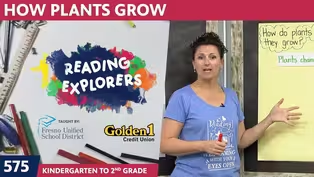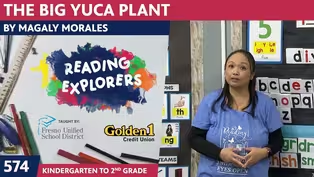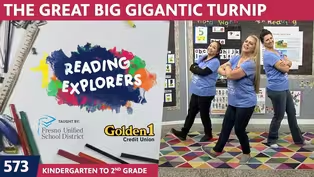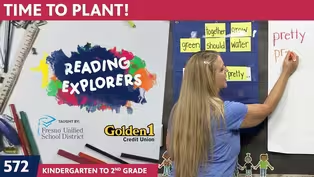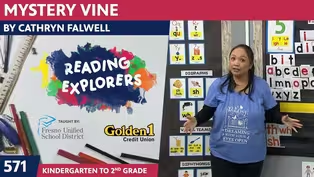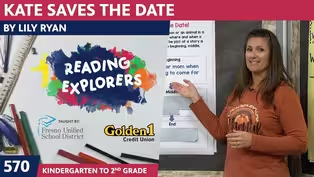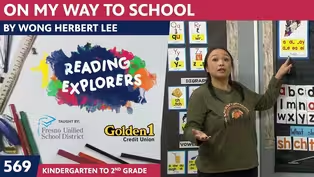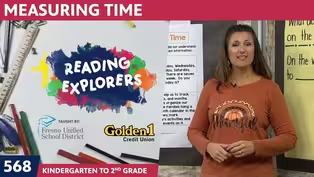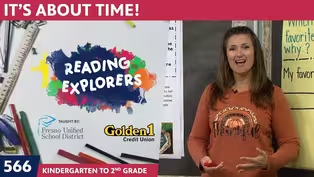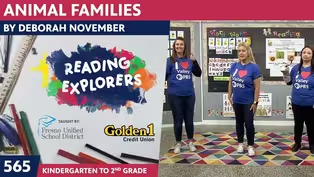
3-354: Suffixes & Root Words
Season 3 Episode 304 | 14m 12sVideo has Closed Captions
Join Mrs. Nix at Camp Discovery!
Third Grade teacher, Mrs. Nix, welcomes students back to Camp Discovery, a fun learning space packed with reading adventures & fun games!
Problems playing video? | Closed Captioning Feedback
Problems playing video? | Closed Captioning Feedback
Reading Explorers is a local public television program presented by Valley PBS

3-354: Suffixes & Root Words
Season 3 Episode 304 | 14m 12sVideo has Closed Captions
Third Grade teacher, Mrs. Nix, welcomes students back to Camp Discovery, a fun learning space packed with reading adventures & fun games!
Problems playing video? | Closed Captioning Feedback
How to Watch Reading Explorers
Reading Explorers is available to stream on pbs.org and the free PBS App, available on iPhone, Apple TV, Android TV, Android smartphones, Amazon Fire TV, Amazon Fire Tablet, Roku, Samsung Smart TV, and Vizio.
Providing Support for PBS.org
Learn Moreabout PBS online sponsorshipMore from This Collection
Valley PBS and Fresno Unified School District have partnered with Golden 1 Credit Union to create Reading Explorers Lessons for grades Pre-Kindergarten through Third grade. The daily lessons will be taught by Fresno Unified School District teachers and are created to help students practice their reading skills and reinforce lessons during distance learning.
Video has Closed Captions
Learn about the life cycle of a plant on Reading Explorers. (26m 39s)
K-2-574: The Big Yuca Plant by Magaly Morales
Video has Closed Captions
Join the Reading Explorers as we adventure into a new book The Big Yuca Plant. (26m 30s)
K-2-573: The Great Big Gigantic Turnip
Video has Closed Captions
What will happen at The Great Big Gigantic Turnip? (26m 30s)
K-2-571: Mystery Vine by Cathryn Falwell
Video has Closed Captions
The Bell has rung and the Valley PBS Classroom is open once more. (26m 32s)
K-2-570: Kate Saves The Date by Lily Ryan
Video has Closed Captions
Mrs. Nix, Mrs. Hammack and Mrs. Vang are glad to have you join her for a new day. (26m 32s)
K-2-569: On My Way To School by Wong Herbert Lee
Video has Closed Captions
Mrs. Vang is ready for a new day of phonemic awareness and reading comprehension. (26m 40s)
Video has Closed Captions
We review phonics, frequency words and more on Reading Explorers. (26m 45s)
K-2-567: Nate The Snake Is Late
Video has Closed Captions
What happens when Nate the Snake is late to school? (26m 49s)
Video has Closed Captions
It's time for school! How do you know what time it is? (26m 31s)
K-2-565: Animal Families by Deborah November
Video has Closed Captions
Welcome to the Reading Explorers lessons in the Valley PBS Classroom. (26m 14s)
K-2-564: From Caterpillar To Butterfly
Video has Closed Captions
The transformation from Caterpillar to Butterfly is a special one. (26m 52s)
Providing Support for PBS.org
Learn Moreabout PBS online sponsorship♪ Good morning to a brand new day ♪ ♪ Time to learn and games to play ♪ ♪ Learning things is so much fun ♪ ♪ Learning is good for everyone ♪ (whistling) (upbeat music) (whistling) - Good morning third graders, My name is Mrs. Nixon, I am so excited to be here with you to support you as you become amazing thinkers, readers, and writers.
This morning, I was reading a book and did you know you can learn so much information just by opening a book?
I'm telling you.
So this one, this one's all about the Hopi Native Americans and this is a first American.
So the people who were here originally and there are so many interesting things about their tribe and how they used the lands and kind of their history and their story.
And I love learning about the past and a book is a great place to do that.
And so how can you check out books like this and others?
Well it's super easy you can visit your local County library or you can go on Sora, a free app in Fresno Unified and check out hundreds of books, just like that one.
And you can learn so many things.
Now, speaking of Sora here in Fresno Unified, we often like to celebrate our schools that are checking out books and we do kind of a little shout out board right here.
So the top five schools this last week who are checking out on Sora, let's go and check out who was in second place this last week, right there, Ewing Elementary.
Great job Ewing.
So proud of you.
Now, if you wanna see your school up here on our little shout out board, super easy to do it.
All you need to do is check out a book and maybe tell a classmate or two to join you.
And you can get your school's name up on our shout out board.
All right.
So third grade, I have three things that I want us to go through today, but before I do that let me do a quick little shout out about an activity book 'cause I always like to do this and talk about, it's free, it's a free activity book, it's full of puzzles and word searches and games, and all you need to do is send me a note to the address that's popping up at the bottom of your screen or an email.
Let me know a story that you've been reading or something you've learned here at PBS or maybe even in your own classroom.
I'd love to hear all about it.
And I'll put one of these as long as you remember to include your address in the mail for you.
Okay, now we're ready to get started today.
Let's start by warming up those super smart muscles that we have, our brains.
Okay, we gonna do that by looking at our high-frequency words.
And remember, these are words that we see often in our reading and our writing.
And so it's important by third grade that we not only be able to read them but that we're able to write them.
So spelling becomes really important.
I know you've been practicing this week and you've got all of them down, right?
That's okay.
Even if you don't, you keep practicing 'cause I know that you're gonna get it.
So let's go through and let's practice them together.
You read them at home and I'm gonna read them here in the studio.
Here we go.
Big, because, been, black, blue before, both, best, bring and better.
Nicely done third grade.
So today we're gonna look at these two words I've got both, which is B-O-T-H and best B-E-S-T, okay.
How we use these in a couple of sentences.
Can we have hmm kinds of cookies for dessert?
And you are the hmm third grade class.
Oh, you know that one right?
You are the best third grade class.
Absolutely you are.
You're doing a fantastic job.
And can we have both kinds of cookies for dessert?
I'm telling you I always ask I wanna have both kinds, right?
Excellent, all right.
Third grade we're gonna go through let's talk about these inflectional endings.
Now, we're really focusing on the spelling patterns this week when we're adding those inflectional endings.
So we're really, we're talking about adding s, ed and ing.
So when we look at this, let's just talk about when we add s and ed, and what kinds of spelling patterns we have.
So when I have a word that ends with a vowel and then the y for example, let's look at them.
Delay has an ay, pray has an ay, when I have words that have this vowel and then a y there is no spelling changes.
There are no spelling changes.
So if I wanted to say delays or delayed, it doesn't matter I leave it just the way that it is I'm gonna do, I'm gonna just put delayed 'cause that's the first one I grabbed, no spelling changes.
Just add the ed.
Pray if I wanna add the, and change it to prays there is nothing that I need to do except for add an s. All right.
Now the same can't be true if that word ends with a consonant and then a y for example like in reply, we have a consonant ly, okay.
So consonant, which is the l and y in the word apply.
So this is where we're gonna see some change when it's a consonant and a y we change that y to an i, and then we have to add es or ed.
So in reply, let's change it to replied change that y to an I, then we add ed, replied.
If we wanna change apply to applies, change that y to an i and then we add es just like that.
You can see how it's done.
Okay, now when we've got these verbs and we wanna change add the ing, this one's really easy too.
There are no changing to the spelling of any of the words that end with y.
So it doesn't matter if it has vowels or consonants.
Anytime we add that ing, we're good, we can just add it.
So let's just pick a couple of them.
We'll pick one from here that's got the vowel so we've got delay.
We're gonna make it delaying.
No change, just add the y, we'll take one over here, reply and we're gonna add it to ing, replying, and you can see that it doesn't matter if you've got the vowel or vowel when it ends in y we just add the ing, okay.
So let's go over.
I wanna switch gears a little bit and talk about suffixes.
We've got three suffixes that we've been reviewing this week.
These are those letters that are added to an end of a base word to change the meaning of that base word.
Base words are simply that they are words that stand on their own.
They don't have anything else attached to them, they have their own meaning, like care, cheer, and soft.
Those words have their own meaning.
Now suffixes are just groups of letters, they don't, they're not a word by themselves.
So less, ful, and ness change the meaning of the base word.
So less, means without.
So if I have care and I add the suffix less well less means without so careless means I'm without care.
So if I did something very carelessly I really wasn't paying that close attention, I was probably being a little silly and goofy, right?
Okay, so cheer, and I'm gonna add the suffix ful, full simply means that you're full of something.
So if I'm full of cheer, I'm a very cheerful person.
I think about, you know, when you go to a football game or a soccer game, and you're very cheerful, you're yay, go team.
You're full of cheer.
And then ness, n-e-s-s is the state or condition of something so soft, and if I said softness could be talking about the state of a blanket, a blanket has a lot of softness to it and it could be very soft, right?
Okay, what does this look like when we wanna go through and practice it maybe on a worksheet and doing this independently.
So help me out, let's look at it.
It says, add the endings to each word and write the new word on the line, pay attention to possible spelling changes.
Okay, what did we say when we add ing to any word with y?
Does it matter?
Right it doesn't matter, we can just add there's no spelling changes.
So I can say, trying and I'm just gonna put it right there, good.
How about dried?
When I have a consonant and then a y what do I need to do with that y?
You got it, change it to an i, and then add ed.
How about hurries?
Hurries, okay we've got a consonant and a y.
So just like we did in dry, hurries, so I'm gonna write, hurr, what do I do with my y?
Change it to when i add es good, okay.
Playing, again remember any word that ends with a y whenever we're adding ing, do I have to worry?
Nope, I can just add ing and it's just an easy thing.
And then studied, we're adding an ed, I've got a consonant and a y, what do I do when I've got that y?
I wanna change it to an i, and then add my ed.
So don't forget to change your I, okay.
Down here, we gonna practice just a little bit of matching our words that have our suffix to a definition.
So let's look here we've got without color.
So we wanna find something that's without color.
What was without?
Do you remember that suffix?
Less, okay.
So let's find, do we see something with less?
Look I've got colorless.
Yes, excellent.
So we're gonna put that over here.
How about the state of being happy?
Now remember the state of anything would be ness and we've got happy, what do we get when we put happy and ness together?
We've got happiness, here it is right there.
How about one or two more?
Let's see.
Full of delight.
Well, we're gonna have ful right as our suffix so let's look delightful, excellent.
How about one more, without sound would be, what is without?
What was this?
What was the suffix?
Less right, so soundless.
Do you see how easy it is when you know what those suffixes, what they actually mean?
How they can help you?
All right.
Last one state of being lively.
You've got liveliness.
Excellent job.
Okay, let's finish out our day today and let's talk about root words.
Now, remember root words are when we take away all those prefixes and suffixes and it can help us to better understand what, you know what our word means and can help us.
So let's go through, let's read this sentence together and then talk about this underlined word right here.
So she disliked rules that were not fair.
Okay, so if I take the word disliked, do I see any prefixes?
Well, yeah, dis is a prefix so let's move that one out and liked do I see any suffixes or inflectional endings?
I do, I'm gonna take away the ed.
What's my root word?
Like, okay.
So if I know what like means it's something that I enjoy but I put dis in front of it, do you remember what that prefix means?
This means not.
So did she like it a whole lot or did she not like it at all?
Right here because of that prefix I know she did not like rules that were not fair.
You figured it out.
Great job third grade.
Okay, so I just wanna say thanks for hanging out with me today, as you're getting ready for school.
And to remember, you are responsible for your learning success.
So listen, ask questions and share your ideas because together we can do so much more.
Have a fantastic afternoon.
I can't wait to see you back here tomorrow on PBS, stay safe and check out a book.
All right, we'll see ya, bye-bye.
(upbeat guitar music) ♪ Good morning to a brand new day ♪ ♪ Time to learn and games to play ♪ ♪ Learning things is so much fun ♪ ♪ Learning is good for everyone ♪ (upbeat guitar music)
Support for PBS provided by:
Reading Explorers is a local public television program presented by Valley PBS
